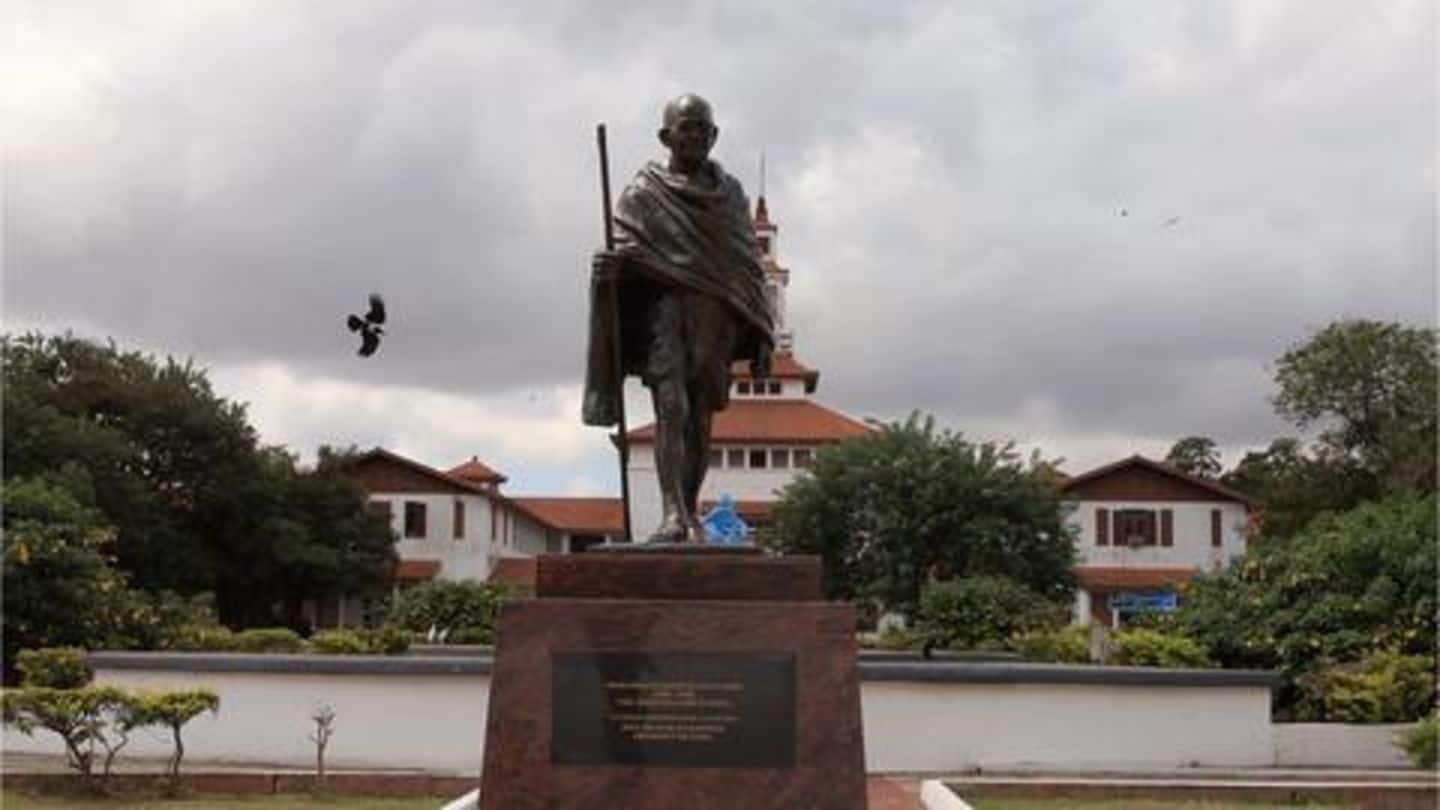
Ghana: Government removes 'racist' Gandhi statue from university grounds
What's the story
A statue of Mahatma Gandhi, which had been unveiled in 2016 by President Pranab Mukherjee at the University of Ghana, has been removed from the university grounds on account of Gandhi's "racist" outlook towards Africans. The statue was removed by the Ghana government based on a petition by the university's lecturers and students, who wanted African heroes to be commemorated instead. Here's more.
Petition
The unveiling of the statue had sparked controversy and agitation
Following the unveiling of the statue at the Ghanian capital, Accra, controversy broke out. Subsequently, lecturers and students filed a petition for its removal, and the consequent agitation resulted in the government ordering that the statue be relocated elsewhere. Students and lecturers both have welcomed the move, saying that the presence of Gandhi's statue had been a constant reminder of racist oppression against them.
Quote
Students celebrate the removal of the statue as a victory
"It's a massive win for all Ghanaians because it was constantly reminding us of how inferior we are," Benjamin Mensah, a student of the university told Agence France-Presse.
Gandhi
Gandhi's views on race have come under fresh scrutiny
Gandhi is revered both in India and abroad for his fight against British colonialism, and his theories of non-violent civil unrest that have inspired generations of reformers, including icons like Martin Luther King Jr. and Nelson Mandela. Yet, Gandhi's views on race have come under fresh scrutiny in light of recent work by scholars that has explored his time in South Africa.
South Africa
Gandhi's years in South Africa exposed him to racial discrimination
In April 1893, an English-educated Gandhi set foot in South Africa, where he would spend 21 years. Once there, Gandhi, who then considered himself "a Briton first, an Indian second", faced the harsh reality of racial discrimination that shattered this illusion. His experiences of racial discrimination in South Africa made him question the standing of Indians in the eyes of the British.
Superiority
In several instances, Gandhi emphasized the racial superiority of Indians
Thus began his struggle to end racial discrimination against Indians living in South Africa. Yet, this struggle did not precipitate into an alliance with the native Africans, who were also the victims of racial discrimination. Instead, Gandhi, in his writings, indicated that he was outraged by Europeans classifying Indians with the natives, and felt that Indians were "infinitely superior" to black people.
Race
He had also put forth racial arguments for superiority
Gandhi began writing about his views on racial segregation as early as 1894, and the racial overtones in his writing intensified over the years. In his quest to end racial discrimination against Indians, Gandhi, in his writings, seemed to place Indians on a higher pedestal than the blacks, but on a lower one than Europeans. He even indicated that the English and Indians shared a common Indo-Aryan ancestry.
Quote
An excerpt from Gandhi's writings on racial segregation
"The Europeans...wish to degrade us [Indians] to the level of the raw kaffir whose occupation is hunting, and whose sole ambition is to collect a certain number of cattle to buy a wife with, and then, pass his life in indolence and nakedness," Gandhi wrote in 1896.
Nuance
Yet, Gandhi's racially charged writings cannot be viewed in isolation
While an examination of Gandhi's writings during his time in South Africa does come across as frankly racist, it would be a fallacy to view them in isolation from his 'other' views about the Africans, written at the same time. On one hand, Gandhi was advocating that Indians be given better treatment than the racially and culturally 'inferior' Africans. On the other hand, he was also sympathetic towards the struggles of the blacks.
Other writings
Instances where Gandhi demonstrated another side
From 1894-1908, in several instances, Gandhi wrote about his concern for the blacks. In one instance, he describes natives as having "simplicity, virtue, and gentleness". In another instance, he wrote that it was "our [Indians'] duty" to raise protest against draconian laws governing the blacks. Gandhi further urged Indians to learn "lessons" from the initiatives taken by the blacks, and supported the rise of local black leaders.
Opinion
Was Gandhi racist? Well, it's a complex question
Thus, Gandhi's attitude towards the blacks is a complex one. While some of his writings most definitely have strong (condemnable) racial overtones, his other writings express sympathy, even (symbolic) solidarity with the struggle of the blacks. Given this complexity, it's best to view Gandhi's views on race as one shaped by the social, cultural, and political currents of the time, and by his own political motivation to end racial discrimination against Indians. That said, emphasizing Indians' struggles over that of the blacks, when the two were the same in essence, definitely deserves condemnation.